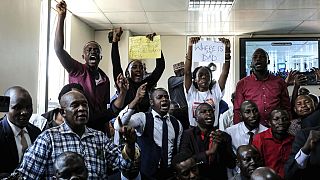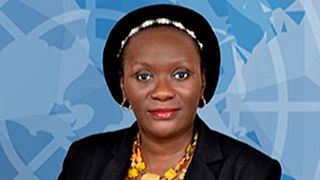Uganda
In Uganda, financial pressure is keeping millions of children out of school.
The region has long had the world’s highest dropout rates, with financial struggles as the leading cause.
In Uganda alone, the cost of education is the biggest source of financial worry for 40% of families, according to the World Bank.
Top government-funded schools now charge nearly $700 in tuition per three-month term.
That's a significant amount in this East African country where annual GDP per capita was $864 in 2023.
At Wampeewo Ntake Secondary School, just outside the capital Kampala, over 2,100 students are enrolled.
But for hundreds of them, staying in school is a constant challenge due to rising and unpredictable tuition costs.
Deputy Headteacher Joanita Seguya sees the impact of these fees every day.
She says, “millions are being kept away because when you learn that there are schools where they pay school fees of 150,000 (Ugandan Shillings, $40.76) for a whole term, these kids study for three weeks, are sent away for school fees, and never return.”
The day Shalom Mirembe was sent home from school last month over unpaid tuition, her father lay dying in a hospital.
Even as her mother, Justine Nangero, sat by his bedside, school officials were calling and demanding payment.
Nangero, a shoe vendor who looks after four children, it was a heartbreaking moment in the daily struggle to pay often unpredictable and unregulated school fees.
Constant threats demanding payment can leave her feeling helpless. Some officials are more tolerant, but eventually they all grow tired of her pleas.
Justine Nangero says it is stressful to keep Mirembe and her other children enrolled in school. “I reached a moment when I went to the hospital thinking it is malaria when they tried checking my blood pressure then they told me my blood pressure is going high but I had so much worries because some of the children were still at home.”
Wampeewo Ntake Secondary School that Mirembe attends outside the capital, Kampala, charges the equivalent of $300 per term.
Its officials expect 70% of fees to be paid at the beginning of a term, but many parents fail to meet that threshold.
Nangero says in addition to the school fees, costs for extra curricular activities add to the financial burden: "They (school) are still demanding fees now how can I pay for this (activity) when I am still demanded of fees."
Some, like Nangero, send their children to school having paid nothing, counting on the mercy of officials.
But measures to track payments include gate passes that show how much is owed and when, and a student may be denied entry, says Seguya, a deputy head teacher at the school, Wampewo Ntakke Secondary.
In the school of more than 2,100 students, roughly 400 are from working-class families that routinely struggle to pay fees, according to Seguya, who said the system can seem harsh.
To accommodate some parents, the school accepts in-kind payments such as vegetables and fruit, she says.
"Some of them whose parents are struggling, some few of them, selected some of them may come with an idea of providing something in kind. Say like 'can I bring cassava,' 'may I bring my potatoes?' "May I bring my greens – 'Buuga', 'Nakati' (vegetables) pineapples? We also have watermelons', we say yes."
But Nangero, whose family shares a single room, has nothing of the sort to offer.
Her shoe business, long drained of cash by school fees, has collapsed.
The death of her husband, whose carpentry once supplemented the family income, has increased the pain.
Mirembe was sent home due to unpaid fees but was allowed to return to school days after her father’s burial.
School fees are a crushing issue for many across sub-Saharan Africa, where the lack of a few hundred dollars can determine a child's future.
The region has long had the world's highest school dropout rates. Reasons vary, but financial pain is the biggest.
Last year, the World Bank said 54% of adults in sub-Saharan Africa rank the issue of paying school fees higher than medical bills and other expenses.
More than anything, it’s the unpredictable tuition hikes — for sometimes questionable reasons — that haunt parents across the country of more than 45 million people.
The Equal Opportunities Commission, a government agency that tracks inequality and discrimination, released a report in September calling for punitive measures against government-supported schools that appear to set excessive fees. It warned that arbitrarily raising fees can force children to drop out.
Attendance falls from 68% in grade school to 22% in secondary school, with financial difficulty the main reason for failure to continue studies, according to new figures from the Uganda Bureau of Statistics.
Uganda does have a program for universal secondary education, introduced in 2007 and similar to one for primary education, but such schools are often rundown and undesirable for many families.
They are generally tuition-free, but parents must pay sometimes burdensome fees for uniforms, textbooks and other items.
When it comes to more popular, and more expensive, private schools, the government is not interested in price intervention, said Dennis Mugimba, a spokesman for the Ministry of Education.
Setting fees for private schools is “purely administrative and it is adjusted according to the business environment,” he said. But certain charges such as those including “capital development" should not be the responsibility of parents, he said.
Such private schools have mushroomed across Uganda and now make up the majority of the country's schools, addressing growing demand but also emphasizing the profitability of education as a business.
Moses Serikomawa is an unemployed father of seven children who dropped out of school in recent years for lack of tuition.
"We are really suffering. The schools are never patient with us. Even if you are left with a balance of 1,000 shillings (0.27 US Dollars) out of 10,000 (2.72 US Dollars) shillings, they will send your kid back home. They don’t care, they will send the child back home until you clear their 1,000 shillings. All they care about is just their business, there is no help at all," says Serikomawa.
Raising a total of over $200 in school fees each term is too much trouble when the family sometimes lacks food, he said.
His oldest child, who would be in high school (preparing for university), dropped out after completing secondary school last year. Now the boy is unemployed.
But his hope, and that of many others, lies in calls for reform so that one day, education might be a right for every child, not a privilege determined by income.











Go to video
Oligui Nguema: A breakthrough or continuity for Gabon? [Business Africa]
02:42
Global healthcare at a crossroads: African scientists seek local solutions
04:40
Young child becomes second person to die of Ebola in Uganda
Go to video
Pics of the day: February 20, 2025
06:06
Frail Ugandan opposition figure back in jail after brief court appearance
11:04
How AI is breaking language barriers in Africa {Business Africa}